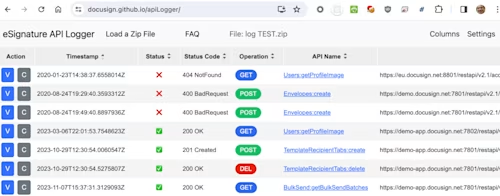
Analyze your API calls with API Logger
This browser-based utility helps you analyze your Docusign API log files for both development and troubleshooting.


The Docusign API Request Logging feature is an important tool, not only for troubleshooting your API application, but also for designing your application by first understanding how the Docusign eSignature web app uses the eSignature API to interact with the Docusign platform.
The API Request Log feature produces a zip file that you download from Docusign via the Docusign web app. After unzipping the file, you can view a set of text files, one for each API request/response. The files are very usable as is, but the new API Logger utility provides some helpful features:
The app unzips and then uses a grid to display the log files’ important information: when was the API call made, the success/failure status of the call, which API call was attempted, the URL that was called, and more.
You can easily sort the grid as needed. For example, select the Status header to sort between the successful and unsuccessful API calls.
The log files natively use Docusign internal method names for the API calls. For many popular API requests, the app displays both the name of the API method used in the Developer Center and a link to the API method’s documentation.
The JSON API request and response bodies are pretty-printed. It’s much easier to read and understand JSON when it’s well laid out on the page.
To view the API call details, select the V (View) button on a row.
To copy the API call’s log entry to the clipboard, select the C (copy) button.
Use the Columns link on the top navigation bar to set which columns are displayed in the grid.
Use the FAQ link on the top navigation bar for more information about the utility.
Use the Settings link on the top navigation bar to customize the utility’s settings.
Does the utility send my log files to a server?
Log files often include secret and PII information, including the names and email addresses of your envelope recipients, the envelope documents themselves, and more. Therefore, you should always be careful to safeguard your log files appropriately.
The API Logger Example app does not send your log files anywhere. All processing is done inside of your browser, on your own computer. No data or metadata is sent to Docusign or anywhere else when you use the app.
How can the utility do all that within the browser?
Clever programming! And it’s open-source, too! See the GitHub repo. When you “upload” your zip file to the utility, the upload is to the JavaScript program running within the web page on your browser, on your computer, not to a server. The JavaScript program then uses an open-source library to decode the zip file into its constituent log files. All of the files are stored, parsed, and displayed using the virtual memory of the utility’s web page—the files are not downloaded to your computer and are not sent anywhere.
API Logger is built as an SPA, a single-page application. With this programming pattern, no web server is required for the application. The entire application can reside in the browser. SPAs can provide a fast user experience: since button selects are handled within the browser, there’s no client/server communications delay. SPAs also offer more application security options, since data is not necessarily being processed by a server, as is the case with client/server applications. As noted above, API logs contain sensitive data. By using an SPA pattern to process the data, the utility avoids exposing the log data.
Any known issues?
If your zip file is very large, then your browser may slow down as it processes the log files. You may receive a “This page is slow” prompt or similar. If you have problems, just close (delete) the browser tab.
Is API Logger a product? Is it supported?
API Logger is an open-source utility. It is not supported. See the License file in the source code for more information. You’re invited to submit pull requests to the repo if you notice an issue and can fix it.
Try it out and let us know your comments!
Try out the API Logger utility today and let us know what you think by filling out an issue report.
Additional resources

Larry Kluger has over 40 years of tech industry experience as a software developer, developer advocate, entrepreneur, and product manager. An award-winning speaker prominent StackOverflow contributor, he enjoys giving talks and helping the ISV and developer communities.
Twitter: @larrykluger
LinkedIn: https://www.linkedin.com/in/larrykluger/
Related posts
Docusign IAM is the agreement platform your business needs





